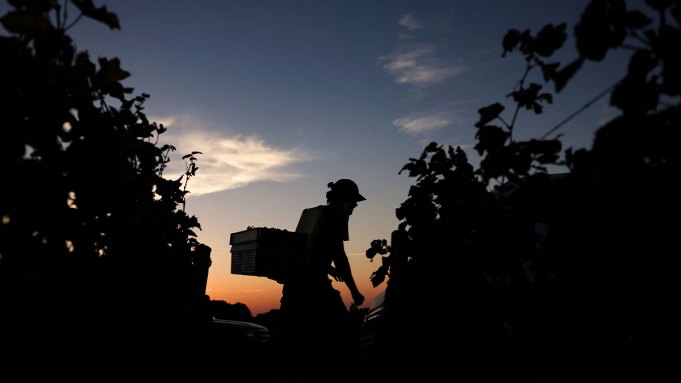This story is from an installment of The Oeno Files, our weekly insider newsletter to the world of fine wine. Sign up here.
After two consecutive vintages that were extolled as among the best in recent memory, Burgundy has hit a speedbump with the 2024 harvest. A cold and wet growing season and ongoing mildew problems mean yields are expected to be down across all of France, according to Agreste, the French Ministry of Agriculture and Food’s statistics arm. While official reports state that the loss could be up to 25 percent in the combined regions of Burgundy and Beaujolais, some producers will be hit even harder. Gregoire Pissot, technical director at Prosper Maufoux in Saint Aubin tells us harvest may be “30 percent to 50 percent smaller—even more in some specific appellations.”
It has been a very rainy year, indeed—50 percent more than normal—and the yields have suffered for it, Pissot tells us. “There are unfortunately less bunches on the vines, and these are much smaller than usual,” he says. At Prosper Maufoux, which has plots in 20 appellations, the team started bringing grapes in on September 9 from renowned vineyards in Saint-Aubin, Meursault, and Puligny-Montrachet, but it has been a tricky picking season. “Harvesting has been much harder to plan than usual, as the ripening process sometimes takes place in the last few days before to harvest,” he says.
Other producers bided time in the hopes that Mother Nature could turn in their favor. “We delayed the harvest because we knew we were going to get strong northern winds, which helped to dry the grapes,” says Florent Latour, CEO of Maison Louis Latour, adding that this has been the most challenging season he has seen in nearly 50 years. Additional pruning was required throughout the summer to create more room for air circulation around the grapes, which reduces rotting caused by excessive wetness.
Yields are down this year.
Louis Latour
Latour began harvesting September 13 and continued until this past Monday. It was all hands on deck with 135 people picking across 125 acres in esteemed appellations such as Corton-Charlemagne and Bâtard-Montrachet for the whites and Romanée-Saint-Vivant and Le Chambertin for the reds. And the increased manpower didn’t stop in the vineyard. Latour deployed more people to sort grapes this year to ensure any fruit exhibiting mildew, mold, or rot would be discarded. He isn’t alone: At smaller wineries, owners and family members have been pressed into service on the sorting line, with many too busy to even answer the phone.
It wasn’t all rain, all the time in Burgundy, or the outlook would be even worse. “Thankfully, we finally had some sun in August, which allowed the grapes to ripen and reach the right level of acidity and sugar,” Pissot says. “The nice levels of acidity should allow the wines to age beautifully, especially the reds.” Latour echoes the sentiment, finding high and stable acidity in the grapes his team brought in, saying he’s hoping “there might be especially nice surprises for the reds.” Reading between the lines, though, this makes us think that the outlook for white Burgundy might be more varied.
Despite all the difficulties, Pissot and Latour are remaining optimistic. Both compare the quality they are seeing this year to 2016, which was greatly diminished due to springtime hail and a wet growing season but has been lauded as a wonderful vintage for red wine. Based on what we’re hearing about 2024, we expect that limited quantities may drive up prices on the most desirable bottles, especially from the best appellations and most sought-after producers, and whites may ultimately be at their best if drunk young. For all the difficulties this year, this is certainly not the worst-case scenario for the vintage.
Do you want access to rare and outstanding reds from Napa Valley? Join the Robb Report 672 Wine Club today.


